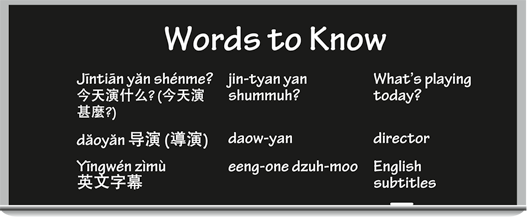Chinese For Dummies (71 page)
Read Chinese For Dummies Online
Authors: Wendy Abraham
Talkin' the Talk
Wendy and Elly decide to go to the movies tonight.
Wendy:
WÇmen jÄ«ntiÄn wÇnshà ng qù kà n yÃbù dià nyÇng ba.
waw-men jin-tyan wahn-shahng chyew kahn ee-boo dyan-yeeng bah.
Let's go see a movie tonight.
Elly:
JÄ«ntiÄn yÇn shénme?
jin-tyan yan shummuh?
What's playing today?
Wendy:
YÃge ZhÄng Yìmóu dÇoyÇn de piÄnzi. WÇ wà ngle nèige mÃngzi.
ee-guh jahng ee-moe daow-yan duh pyan-dzuh. waw wahng-luh nay-guh meeng-dzuh.
A film directed by Zhang Yimou. I forget the name.
Elly:.
Shì shuŠYīngwén de ma?
shir shwaw eeng-one duh mah?
Is it in English?
Wendy:
Búshì, kÄshì yÇu YÄ«ngwén zìmù.
boo-shir, kuh-shir yo eeng-one dzuh-moo.
No, but there are English subtitles.

Hopping Around Bars and Clubs
Are you a night owl who, after a full day of sightseeing and even an evening concert, still has the energy to go barhopping and carousing around fun clubs? If so, you need to know some common barspeak, especially when you're on vacation in a toddlin' town like Shanghai â or Chicago, for that matter. After all, not everyone you meet or go out with may be fluent in English. The following phrases may come in handy when you're out exploring the local pubs and dance halls:
 NÇ xiÇng gÄn wÇ tià owÇ ma?
NÇ xiÇng gÄn wÇ tià owÇ ma?
ä½ æ³è·æè·³èå
? (
ä½ æ³æ ¹æè·³èå
?) (nee shyahng gun waw tyaow-woo mah?) (
Would you like to dance?
)
 QÇng lái yìpÃng pÃjiÇ.
QÇng lái yìpÃng pÃjiÇ.
请æ¥ä¸ç¶å¤é
. (
è«ä¾ä¸ç¶å¤é
.)
(cheeng lye ee-peeng pee-jyoe.) (
Please bring me a bottle of beer.
)
 WÇmen dà o nÇr qù tià owÇ?
WÇmen dà o nÇr qù tià owÇ?
æ们å°åªå¿å»è·³è
? (
æåå°åªå
å»è·³è
?)
(waw-men daow nar chyew tyaow-woo?) (
Where can we go to dance?
)
 WÇ néng bùnéng qÇng nÇ hÄ jiÇ?
WÇ néng bùnéng qÇng nÇ hÄ jiÇ?
æè½ä¸è½è¯·ä½ åé
? (
æè½ä¸è½è«ä½ åé
?)
(waw nung boo-nung cheeng nee huh jyoe?) (
May I get you a drink?
)
 YÇu méiyÇu rùchÇng fèi?
YÇu méiyÇu rùchÇng fèi?
æ没æå
¥åºè´¹
? (
æ没æå
¥å ´è²»
?)
(yo mayo roo-chahng fay?) (
Is there a cover charge?
)
When you go to a bar with friends, you may ask for some
bÄ«ngzhèn de pÃjiÇ
å°éçå¤é
(
å°é®çå¤é
)
(beeng-juhn duh pee-jyoe) (
cold beer
) or maybe some
hóng
红
(
ç´
)
(hoong) (
red
) or
bái
ç½
(bye) (
white
)
pútáo jiÇ
è¡èé
(poo-taow jyoe) (
wine
). And don't forget to ask for some
huÄshÄngmÇ
è±çç±³
(hwah-shung-mee) (
peanuts
) or
tÇdòupià n
åè±ç
(too-doe-pyan) (
potato chips
) so you don't get too sloshed with all that
pÃjiÇ.
 Â Fun & Games
 Fun & Games
Match the English term on the left with the corresponding Chinese term on the right. You can find the answers in
Appendix D
.
1. movie theatre | a. yīnyuè huì |
2. concert hall | b. Jīngjù |
3. museum | c. yìshù |
4. art | d. bówùgu |
5. concert | e. yīnyuè tīng |
6. Peking opera | f. dià nyÇng yuà n |
Chapter 11
Taking Care of Telecommunications
In This Chapter
 Picking up the phone
Picking up the phone
 Understanding cellphone lingo
Understanding cellphone lingo
 Dealing with answering machines and voicemail
Dealing with answering machines and voicemail
 Navigating the Internet and checking e-mail
Navigating the Internet and checking e-mail
A
lthough e-mail may be the preferred method of communication these days, you can't duplicate hearing your loved one's
shÄngyÄ«n
声é³
(
è²é³
) (shung-yeen) (
voice
) on the other end of the line or reaching just the right person you need to begin discussing a merger over the computer. All the more reason to know how to use the telephone in addition to surfing the Net.
The art of making a phone call in another language, and even in another country, is just that â an art. To master it, you have to feel comfortable with such basics as using the telephone
in the first place. What do you actually say when someone picks up on the other end? This chapter helps you navigate the communication terrain, whether you're in Idaho or China.
Getting Familiar with Telephone Terms
Before even going near a
dià nhuÃ
çµè¯
(
é»è©±
) (dyan-hwah) (
telephone
), you may want to become familiar with some common Chinese words and phrases connected to using one. In fact, you see so many different kinds of phones nowadays that you shouldn't have a problem finding out which one best suits your needs:
 gÅngyòng dià nhuÃ
gÅngyòng dià nhuÃ
å
¬ç¨çµè¯
(
å
¬ç¨é»è©±
)
(goong-yoong dyan-hwah) (
public telephone
)
 shÇujÄ«
shÇujÄ«
ææº
(
ææ©
)
(show-jee) (
cellphone
)
 wúxià n dià nhuÃ
wúxià n dià nhuÃ
æ 线çµè¯
(
ç¡ç·é»è©±
)
(woo-shyan dyan-hwah) (
cordless phone
)
Be sure to check out a few things beforehand, like what
dìqÅ« hà omÇ
å°åºå·ç
(
å°åè碼
)
(dee-chyew how-mah) (
area code
) and
dià nhuà hà omÇ
çµè¯å·ç
(
é»è©±è碼
)
(dyan-hwah how-mah) (
telephone number
) to
bÅ
æ¨
(
æ¥
)
(baw) (
dial
). Sometimes you need the help of a
jiÄxià nyuán
æ¥çº¿å
(
æ¥ç·å¡
)
(jyeh-shyan-ywan) (
operator
) for some of the following kinds of calls, but others you can take care of on your own:
 bÄnshì dià nhuÃ
bÄnshì dià nhuÃ
æ¬å¸çµè¯
(
æ¬å¸é»è©±
) (bun-shir dyan-hwah) (
local call
)
 chángtú dià nhuÃ
chángtú dià nhuÃ
é¿éçµè¯
(
é·éé»è©±
) (chahng-too dyan-hwah) (
long-distance call
)
 duìfÄng fùfèi dià nhuÃ
duìfÄng fùfèi dià nhuÃ
对æ¹ä»è´¹çµè¯
(
å°æ¹ä»è²»é»è©±
)
(dway-fahng foo-fay dyan-hwah) (
collect call
)
 guójì dià nhuÃ
guójì dià nhuÃ
å½é
çµè¯
(
åéé»è©±
)
(gwaw-jee dyan-hwah) (
international phone calls
)